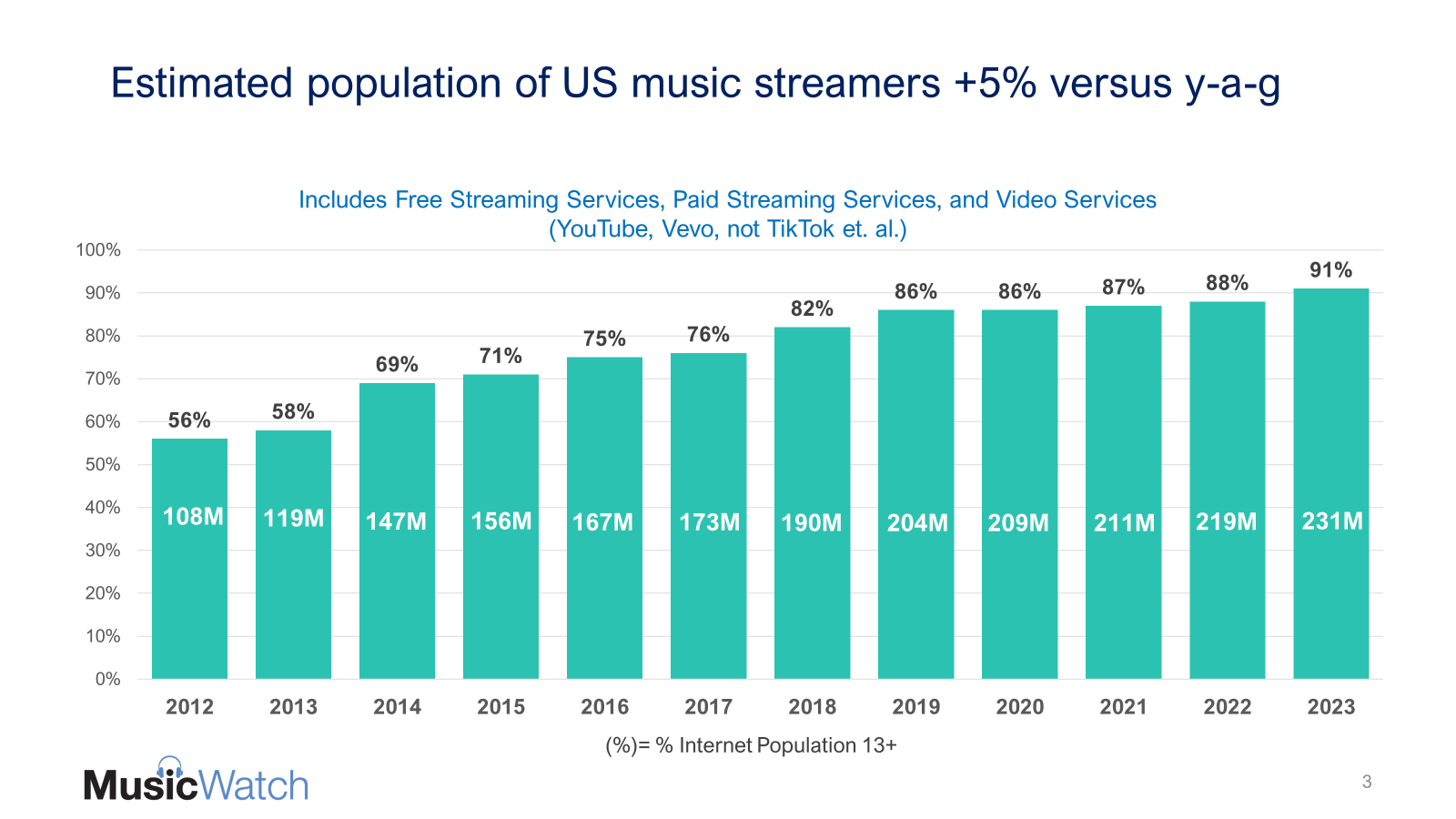MusicWatch Annual Music Study points to continued health of the US music market, a record number of paid subscribers, and increased spend on recorded music.
Over 90% of internet users are streaming music in the US.
MusicWatch today published its 22rd edition of the US Annual Music Study, the most comprehensive overview of audio and music purchasing and listening in the US. MusicWatch shared a “bakers dozen” of facts and findings from the study.
1. Growing customer base. The US recorded music category continues to show healthy growth, with an increase of 10 million “buyers” in 2023. Buyers include those who purchase or pay for CDs, Vinyl Records, Digital Downloads or Music Streaming Subscriptions.
2. Increased spend. Spending on recorded music increased by 7 percent compared with year-ago, thanks to expenditures on Streaming Subscriptions, Vinyl and CDs.
3. Record numbers of paid subscribers. The number of paid music subscribers in the US hit a record, at 109M; 136M if SiriusXM and Amazon Prime music listeners are included. That means over half the population* are paying for an audio subscription.
4. More “juice to squeeze”. There is potential for additional subscription growth, though 7 of 10 Millennials already pay to subscribe. This places a premium on moving GenZ from free to paid services as well as converting the older, and more resistant, demographic.
5. The Walkman dream realized. The top reason for music streaming is the ability to listen to music anyplace and anywhere. Connectivity resonated as a key theme motivating subscribers.
6. Happy Birthday HipHop. In 2023 HipHop (finally) passed Classic Rock as America’s favorite genre, as measured by what we listen to, follow on social, purchase, interact with on streaming services or spend money on live events.
7. Content opportunities abound. Eighty percent of streamers regularly listen to audio categories besides music. Comedy, current events and podcasts closely compete for the #2 spot.
8. Will the vinyl revolution continue? Nearly nine of ten vinyl buyers plan to buy more or the same number of records in 2024.
9. End of the trend coming? The TikTok juggernaut continued in 2023, with 8 percent more users specifically engaging in music-based activities on the platform. Social video accounted for an increasing share of music listening time.
10. Dialing in. Music on broadcast radio, while not the powerhouse it once was, gained listeners in 2023 and continues to be the #1 in-car listening option- used by 69% of in-car listeners.
11. Pirate ships sinking. Music piracy continues to dampen, with fewer overall users getting files from mobile apps, streamripping, file transfers and P2P networks. Sharing of streaming accounts is also in decline.
12. Superfan gap? One in five (about 50 million) consider themselves superfans for their favorite artists, yet only 9% of these elite fans purchased a VIP package created by artists for fans (VIP live experience, exclusive CDs, vinyl or merch). Meaning there’s opportunity to close the gap between fanship and revenue generation. The good news is that half these superfans are active spenders. They bought CDs, vinyl, download, merch or tickets to live events at stadiums or festivals within the past year.
13. Remember the future! Streamers are interested in lots of potential capabilities, from AI to gaming integration and real-time livestreams. One of the top features remains hi-resolution sound quality. One in three streamers strongly agree with all three of the following:
-Obtaining the best quality sound is important.
-They would be interested in streaming or buying more in hi-res or immersive formats.
-They would be willing to pay more for hi-res sound quality.
*The MusicWatch Annual Music Study is compiled from two surveys; the core AMS study is conducted online among 4,000 respondents, weighted and projected to represent the US internet population aged 13 and older. audiocensus is a separate study of 3,000 and is the longest running US survey of music and audio time spent listening.
